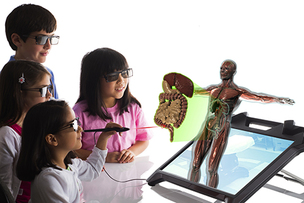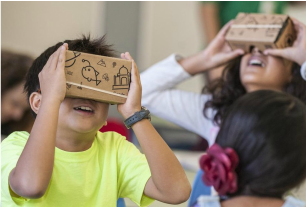This is a great question and there are just so many ways I could answer, but this is a tremendously important reflective process to do on a regular basis because your answer will, obviously, change over time. I am a people person, though I have not always considered myself one. I am an 'introverted extrovert' and I find that many of the instructional coaches I meet define themselves the same way. It's the relationship building, the creation of trust and collaboration, and inspiring and empowering others that I find is not only a strength, but what makes this work so rewarding.
The fastest way I have found success fostering relationships is to meet people where they are in their capacity, knowledge, skills, and even emotionally. I tap into their level of concern and THAT is my starting point. Furthermore, I don't package any of the professional learning I deliver - everything is customized for the needs and strengths of a given educator or district. Just today I had an educator share with me that they appreciated that I "get them" and the job they do everyday. And it helps to be both professional and playful - you just gotta laugh and have fun sometimes, and my capacity building sessions are a combination of these two. Everything I do as a coach centers around relationships and trust and I am so thankful I have this strength. However, it is also a challenge when that relationship does not develop in a way that enables me to quickly support and build capacity. It may be the culture of a school or district I am working within - the need for collaboration and sharing are not commonplace and thus a struggle even to get started - but this can't be a deterrent. If I can't make the connection, I find someone who can, a colleague, a student, someone to open that door so the coaching can happen. I am always striving to improve myself and my skills, being open to learn from others, reading everything I can get my hands on, and staying connected to my professional learning network, both in the office and online. I learn SO much from my colleagues in the field and together we strive to improve together. But no matter what, we must remember to celebrate - celebrate the big successes and the small. We even need to celebrate when we 'Fail Forward' and things don't work out like we planned. It is in failing that we learn, and the sooner we embrace it, learn from it, and try again, the stronger we will all be.
4 Comments
 For many of us the idea of Virtual Reality in the classroom is the stuff of science fiction, but today it is a reality: from the traditional desktop/laptop to the fully immersive virtual experience via wearable VR. Imagine teaching history where your students can explore the historic buildings of Ancient Rome, or be able to walk around Athens or Greece. Consider studying the ecosystem of the ocean while sitting at it’s bottom, or using a virtual scalpel to dissect that digital frog. Virtual Reality can be used in so many areas of curriculum and in as many ways as your imagination can come up with. These fully immersive setups include tracking systems that records and analyses students movements in the virtual space, showing the illusions of depth that only adds to the experience. So students can actively immerse themselves in the content and explore complex subject, theories and concepts.  Google Cardboard This is an immersive experience for everyone. With the help of your smart phone, and a cardboard interface, (buying one can be as little as $8, or you can make your own with the amazing help from instructables.com). All you do is drop your phone in and start exploring. The Google Cardboard apps are extensive and there is a little bit of everything, and Google Cardboard for Education has excellent ideas for use and lesson planning. Some of my favorite Google Cardboard apps include: Titans of Space: Titans of Space is, in my own opinion, the best educational app available for the Google Cardboard. Even with a really simple VR technology like the Cardboard, Titans of Space manages to convey the awesomeness of our universe in an incredible VR experience. Discovery VR: Discovery VR is a VR adventure that will let you explore our world with 360° dynamic videos. Excellent use of VR to teach about ecology, conservation, adventure and exploration. We all know that the resolution of 360° videos need to be improved for a great virtual reality experience, but Discovery VR is still a must have for educational apps for the Google Cardboard. InMind VR: InMind VR is a great educational VR game that will take on a journey into the patient’s brains in search of the neurons that cause mental disorder. This experience might be less educational that other apps in this top 5, it’s still a must for all of you interested in educational VR apps. I also really like Random 42 that will let you take a visually stunning and scientifically accurate 3D ride inside the human body. Egyptian Mysteries, an immersive investigation game in the ancient Egypt. Egyptian Mysteries uses the immersive aspect of the Google Cardboard to take you on a trip in the ancient Egypt, a must try.  zSpace I recently had the opportunity to check out the VR system zSpace. zSpace brands itself as the “ultimate immersive learning experience” that allows students to interact with objects and understand the concepts behind them. With zSpace, students can learn highly engaging tasks that are often too complex, expensive, and dangerous for the classroom. It is truly something that needs to be seen to be believed. Its truly stunning and realistic learning environment touted lessons and virtual experiences. The system included science labs, lessons on geography and history, as well as physics simulations. I “held” a virtual human heart in my hand and could feel it beating – SO cool and creepy at the same time. I am so excited to feature both Google Cardboard and zSpace at my upcoming Coaching Digital Learning Institute and hope to learn even more when I get the chance to play with it again. Please share any favorite VR apps, tools, and/or tricks in the comments below. This blog is inspired by the Ed Tech Coaches Network Blog Challenge #ETCoaches . |
AuthorJaclyn coaches and assists K-12 educators, ITFs, and Administrators to adapt, not adopt – fostering digital initiatives to transform professional learning through changes in pedagogical shifts and meeting the needs of all learners to champion creativity and innovation. @jaclynbstevens Categories
All
Archives
September 2020
|

 RSS Feed
RSS Feed